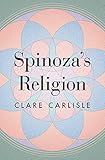Spinoza's Religion : A New Reading of the Ethics / Clare Carlisle.
Material type: TextPublisher: Princeton, NJ : Princeton University Press, [2021]Copyright date: ©2020Description: 1 online resource (288 p.) : 2 b/w illusContent type:
TextPublisher: Princeton, NJ : Princeton University Press, [2021]Copyright date: ©2020Description: 1 online resource (288 p.) : 2 b/w illusContent type: - 9780691224206
- Ethics, Modern -- 17th century
- Philosophy and religion -- History -- 17th century
- Religion -- Philosophy
- PHILOSOPHY / Ethics & Moral Philosophy
- Age of Enlightenment
- Aristotelianism
- Atheism
- Baruch Spinoza
- Calvinism
- Causality
- Christian theology
- Christian tradition
- Christianity
- Cognition
- Conatus
- Concept
- Conceptions of God
- Consciousness
- Copyright
- Critique
- Definition of religion
- Deism
- Divine grace
- Divine law
- Dogma
- Epistemology
- Essence
- Eternal life (Christianity)
- Ethics (Spinoza)
- Ethics
- Ex nihilo
- Existence of God
- Existence
- Explanation
- Four causes
- God
- Good and evil
- Henry Oldenburg
- Heresy
- Hermeneutics
- Humility
- Idealism
- Immanence
- Intelligibility (philosophy)
- Judaism
- Justification (theology)
- Lecture
- Love of God
- Loving-kindness
- Lutheranism
- Magis
- Meditations
- Mennonite
- Modernity
- Morality
- Multitude
- Natural philosophy
- Neoplatonism
- Obedience (human behavior)
- Omnipotence
- Omniscience
- On Religion
- Ontology
- Orthodoxy
- Panentheism
- Pantheism
- Philosopher
- Philosophy of religion
- Philosophy
- Piety
- Princeton University Press
- Principle
- Proslogion
- Protestantism
- Reality
- Reason
- Relationship between religion and science
- Religio
- Religion
- Religious philosophy
- Religious text
- Rhetoric
- Sadness
- Secularism
- Self-love
- Spinozism
- Spirituality
- Stoicism
- Subjectivism
- Suggestion
- Summa Theologica
- Superstition
- Supreme Being
- Søren Kierkegaard
- Teleology
- The Philosopher
- Theology
- Thomas Aquinas
- Thomism
- Thought
- Treatise
- Understanding
- World view
- Writing
- 199/.492 23
- B3974 .C37 2021eb
- online - DeGruyter
| Item type | Current library | Call number | URL | Status | Notes | Barcode | |
|---|---|---|---|---|---|---|---|
 eBook
eBook
|
Biblioteca "Angelicum" Pont. Univ. S.Tommaso d'Aquino Nuvola online | online - DeGruyter (Browse shelf(Opens below)) | Online access | Not for loan (Accesso limitato) | Accesso per gli utenti autorizzati / Access for authorized users | (dgr)9780691224206 |
Frontmatter -- Contents -- Introduction: The Question of Religion -- Chapter one Philosophy and Devotion -- Chapter two What Is the Ethics? -- Chapter three Being-in-God -- Chapter Four Whatever We Desire and Do -- Chapter Five Participating in Divine Nature -- Chapter Six Acquiescentia -- Chapter Seven How to Love God -- Chapter Eight Eternal Life -- Chapter Nine Spinoza’s Religion -- Afterword ‘The path to these things’ -- Acknowledgements -- Notes -- Works Cited -- Index
restricted access online access with authorization star
http://purl.org/coar/access_right/c_16ec
A bold re-evaluation of Spinoza that reveals his powerful, inclusive vision of religion for the modern ageSpinoza is widely regarded as either a God-forsaking atheist or a God-intoxicated pantheist, but Clare Carlisle says that he was neither. In Spinoza’s Religion, she sets out a bold interpretation of Spinoza through a lucid new reading of his masterpiece, the Ethics. Putting the question of religion centre-stage but refusing to convert Spinozism to Christianity, Carlisle reveals that “being in God” unites Spinoza’s metaphysics and ethics. Spinoza’s Religion unfolds a powerful, inclusive philosophical vision for the modern age—one that is grounded in a profound questioning of how to live a joyful, fully human life.Like Spinoza himself, the Ethics doesn’t fit into any ready-made religious category. But Carlisle shows how it wrestles with the question of religion in strikingly original ways, responding both critically and constructively to the diverse, broadly Christian context in which Spinoza lived and worked. Philosophy itself, as Spinoza practiced it, became a spiritual endeavor that expressed his devotion to a truthful, virtuous way of life. Offering startling new insights into Spinoza’s famously enigmatic ideas about eternal life and the intellectual love of God, Carlisle uncovers a Spinozist religion that integrates self-knowledge, desire, practice, and embodied ethical life to reach toward our “highest happiness”—to rest in God.Seen through Carlisle’s eyes, the Ethics prompts us to rethink not only Spinoza but also religion itself.
Mode of access: Internet via World Wide Web.
In English.
Description based on online resource; title from PDF title page (publisher's Web site, viewed 29. Jun 2022)


